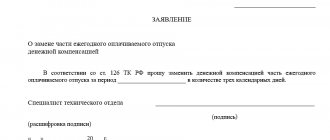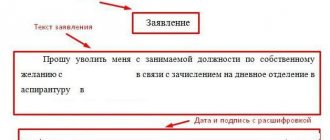One day, while talking with an acquaintance, he admitted to the author of the article that he was fired “under the article.” In the business world, where it is customary in the vast majority of cases to “ask” unwanted employees to leave “on their own,” this sounded a little crazy. When asked how this happened, he evasively made it clear that in their organization the director tries with all his might to adhere to the norms of the Labor Code of the Russian Federation. A comment followed from us, allegedly, if this is the case, then the grounds for this form of dismissal must be much more than serious. In turn, he said that he came to work with a hangover, but not drunk. “Doesn’t your director drink himself?” – we asked in a joking manner. “Yes, who knows... I just talk too much about what I think. It probably has something to do with it,” came the answer.
Of course, the interlocutor’s persuasion to appeal this decision in court did not inspire him; on the contrary, he referred to the need to look for another job. Against this background, we decided to study this issue, find out when and under what circumstances it is possible to dismiss an employee under this very “article”, what is needed for this and what tools are available to resolve the issue in a more peaceful way than this.
Let's clarify the concepts
As our client correctly noted, everyone who has or has dealt with personnel is well aware that, as such, dismissal “under an article” is an incorrect definition. For any resignation from a position reflected in the work book, order and application, there must be a basis in the form of an article from the Labor Code of the Russian Federation. Dismissal “at the initiative of the employee” also applies to this rule (Article 77, paragraph 3, part 1). Consequently, what we are talking about is dismissal for a “bad article,” which in the future can have a detrimental effect on the employee’s career, deprive him of the opportunity to get a job in a “good” company, etc. Moreover, the presence of a “bad” article as a basis for dismissal may become a reason to ask additional questions not only at the interview stage, but also during the process of undergoing a check with the organization’s security service. Therefore, in the following text we will adhere to the wording “employer initiative”.
Don’t miss: “The content of a social network page as a basis for dismissing an accountant”
From scratch or replacing the work book with a new form
One of the easiest ways to eliminate the problem with a negative record is to lose the work book. Its absence, of course, can confuse the administration of the enterprise. But be that as it may, the organization remains obligated to issue a new document upon employment. If the citizen is satisfied with the employer, then no problems with hiring will arise. The applicant will only have to pay for a new book, since it is a strict reporting form. But you can always purchase it yourself, since the book is on free sale.
The only thing that will make further work difficult is the inability to confirm your work experience. On the other hand, in modern enterprises the uniform length of service for calculating payments has been abolished. Each organization has its own profile period of work.
When there is an absolute need to confirm your work experience, you can always send a request to the places of work where the citizen had an employment relationship. In this way, you can always restore personal data, for example, before your upcoming retirement. Also, a duplicate work record book can be restored by contacting the employer who hired the citizen before the negligent organization.
Very tough initiative
For your information, it is worth mentioning when an employer not only has the right, but must take measures to “get rid of” an employee if:
- There was absenteeism or absence from work without a valid reason;
- The subordinate has repeatedly refused or evaded the performance of official duties;
- Accordingly, he constantly violates the requirements of the internal regulations;
- He came to work drunk or under the influence of drugs;
- They divulged state and commercial secrets;
- He stole property entrusted to him;
- He committed a number of immoral acts (mainly concerning educators and teachers).
This list can be continued with several more points, but their meaning is similar to those indicated. In principle, each of them seems logical enough to punish a colleague to the fullest extent of corporate law.
Why can they get fired?
It is violations of the PVTR and failure to fulfill or improper fulfillment of one’s job duties stipulated by the employment contract and job (work) instructions that most often give the employer reason to bring the employee to disciplinary liability (in the form of a remark, reprimand). One or two violations - and you can be fired for repeated failure to fulfill job duties. A prerequisite for dismissal for repetition is that the employee has had at least one disciplinary sanction (within a year). Therefore, we recommend that you appeal each order/instruction on bringing you to disciplinary liability. Such orders can be appealed to the CCC or to the court no later than 3 months.
If you are nevertheless fired (for any of the above and other reasons), you have a month to appeal the dismissal order to the court at the location of the employer. At the same time as requesting reinstatement at work, ask the court to recover from the employer wages for the days of forced absence and compensation for moral damage.
If you are a member of a trade union , then trade union lawyers will provide free legal assistance in restoring your rights.
What are the difficulties?
According to our client, the problem for the employer is that dismissal under Article 81 of the Labor Code of the Russian Federation, which includes the above reasons, implies documentary evidence of illegal actions of employees. For example, the fact of theft must be recorded in the protocol, where the perpetrators must be caught, as they say, “red-handed.” From the point of view of the Legislator, the state of alcoholic intoxication cannot be determined “by sight”. In the case of our interlocutor, who was fired for precisely this reason, he should have undergone a medical examination that would have recorded the act of intoxication. “Blowing into a tube” is the most harmless and fastest means, from the point of view of identifying results. The “hangover” condition that we talked about does not apply to this rule, because the person drank not on the day he went to work, but on the previous day and at the moment, theoretically, he is able to do his job. As for malicious violations of internal regulations, everything is ambiguous here too. There is such a thing as “absenteeism” - the absence of an employee from the workplace for the entire day for an unexcused reason and without providing sick leave. Malicious lateness means not showing up for work within four hours of the start of the working day. If an employee is late by an hour once, then it would be incorrect to fire him under the heading “for absenteeism.” Moreover, according to the regulations, the employer is obliged to first make an official reprimand to the employee, followed by a reprimand and only then dismissal. In two cases, it is necessary to take an explanatory note from the employee with a detailed description of the reasons for being late and, preferably, with a note that he “will not do this again.” Without these papers, dismissal is impossible. Forcing an employee to draw up explanatory notes retroactively is illegal. If he can record these coercions on a tape recorder, then he can easily prove his case in court, because Audio recordings have recently begun to be taken seriously by Russian courts. Read our article about this.
Medical indications
If, after an illness or injury, an employee brings a medical report about complete loss of ability to work, then the employer has to dismiss him on the basis of clause 8 of Part 1 of Art. 77 Labor Code of the Russian Federation. A similar decision is made when an employee has been given a certificate of partial disability by doctors, but the company does not have a suitable job for him or he refuses the one that is offered to him.
Please note: in case of dismissal due to disability, it is not necessary to obtain a separate application from the employee. The basis for issuing an order to terminate the employment relationship will be a medical report.
Read more: “How to fire a disabled person of groups 2 and 3”
Employers' opinion
In order to understand the mood in the business community regarding our topic, we conducted a small survey and asked our colleagues how they feel about this kind of layoffs and whether they consider this measure justified? These two comments, in our opinion, will be the most revealing:
“I believe that it is undesirable to fire an employee on his own initiative. Firstly, the labor inspectorate can “attach” and torment you with questions regarding the reasons for such a dismissal and the same papers that are needed there. Secondly, no matter how unsuitable, in our opinion, an employee may be, we still don’t want to ruin his life. I personally know several directors who are absolutely indifferent to how the fate of their subordinates will turn out after dismissal. Every delay is recorded, reprimanded and entered into the work book, etc. In general, they behave quite harshly. Workers, but they want it like silk. In our company, we have never resorted to this measure, and I hope we will not need it.”
And here's another one:
“We will dismiss the employee under the article if he himself does not want to leave peacefully. There was a recent case when they verbally informed the manager that it was time for us to say goodbye and “asked” him to work for the required two weeks. At first he agreed, but after a few days he simply stopped coming to work. Of course, there shouldn’t have been much use from him, but still the rule is the rule and you can’t disappear from sight like that. They wrote him an SMS saying that if he does not show up on time, he will be fired under the article for absenteeism. He showed up on the doorstep literally an hour later and worked the remaining days. Honestly, if he had never gotten in touch, by God they would have fired him for absenteeism!
In general, there is a similar approach of the two organizations to solving this issue. The difference comes down to the fact that some people are ready to resort to this as a last resort, while others will not do this until the very end.
Myths that employers believe in
An employee who faces the threat of dismissal at the employer’s initiative should be well aware of the misconceptions experienced by his director, chief accountant and HR department employee (if he is inexperienced). For example, you cannot fire a woman who is preparing to go on maternity leave, child care, or even if she has a baby in her arms, no more than 3 years old. In this case, only dismissal “at one's own request” is allowed. If the employee is the only breadwinner in the family and has not only his own children under his care, but also adopted children, then the dismissal will also be illegal. If an employee was able to provide sick leave for periods of absence, then these periods should in no case be considered absenteeism. It seems to you and me that we are talking about common truths. But all this would be good, but many directors reason a little differently, namely, according to the principle: “my company + my subordinate = my rules.” There is a mistake in this formula - there is a main regulator of business relations in the form of labor legislation. We recommend that our readers study in more detail the articles of the Labor Code of the Russian Federation devoted to dismissal and be, as they say, “all armed” if the matter with dismissal begins to take on a less rosy character than the employee would like.
How to avoid giving reasons for dismissal?
In order not to give reasons for dismissal for repeated failure to fulfill job duties without good reason, if you have at least one disciplinary sanction, we suggest that you remember, or better yet, re-familiarize yourself with the internal labor regulations in force at the enterprise. When studying them, pay attention to the working hours regime existing at the enterprise: what time the work shift begins and ends, the time of pre-shift meetings, the presence of regulated breaks, including for lunch, their beginning and end, the procedure for going on vacation, registration of time off and other rules of behavior. There are many of them in PVTR.
The internal labor regulations must be carefully studied and, of course, try to comply with them. Any absence from work or early departure from work (even for half an hour), use of time off, donor days - everything must be documented in writing with the permission of management.
The second document you should know is your job description. It spells out all the duties that you must perform in your position (profession). Pay special attention to your obligation to follow all orders of your immediate supervisor, since this obligation is often specified in the instructions and it is this violation that bosses use to bring the employee to disciplinary liability (although often illegally).
A disciplinary sanction may be imposed no later than one month from the moment the misconduct is discovered.
conclusions
Most company managers tend to believe that it makes no practical sense to fire an employee on their own initiative. Yes, this solves the problem, and the company stops seeing the boring face in the workplace. But there is also the so-called “own desire”, which, in most cases, is offered to subordinates. Fortunately, if the director proposes to resign, then in the future it will be more correct to make an entry “by agreement of the parties.” It implies certain financial compensation for the subordinate and therefore companies do not favor it. If in this case the employee begins to “download his rights,” then this may anger the director, and he will offer to “quit as expected.” In any case, we recommend standing up for your rights and proceeding from a sense of fairness in making decisions.
Thank you for your attention and see you again!








